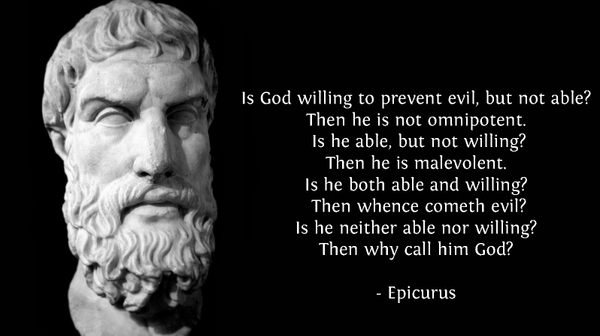Turning the Problem of Evil On Its Head
by Joe Heschmeyer
Filed under Objective Morality, The Problem of Evil
Many atheists are fond of using the argument from evil to debunk the notion of God. It goes something like this:
- If God is all-powerful (omnipotent), He could stop evil.
- If God is all-loving (omnibenevolent), He would stop evil if He could.
- Therefore, if an omnipotent, omnibenevolent God existed, evil would not.
- Evil exists; therefore, an omnipotent, omnibenevolent God does not.
Another variation of the argument was put forward by the Greek philosopher Epicurus, centuries before the time of Christ:
Against Catholics, this argument is stronger rhetorically than logically. But against atheists, it's ironically quite devastating. Let me explain what I mean.
I. The Problem of Evil for Catholics
Logically, this argument misunderstands what's meant by God's omnipotence. Omnipotence means that God cannot possibly be more powerful than He currently is. His power is perfect. But within these traditional confines, we still acknowledge that God cannot do the logically impossible. He cannot, for example, will what is contrary to His Will. Why? Because that's a meaningless self-contradiction.
Herein lies the easiest answer to the problem of evil:
- God gives us free will, because free will is inherently good.
- Free will entails the possibility of doing what is contrary to God's will (this is what we know as evil).
- Thus, evil exists, because of man's actions, rather than because of God.
Thus, the notion of an all-loving God is consistent with abundant free will, and abundant free will is consistent with the presence of evil (I discuss that more on my own blog.) You may disagree with that solution—you may not see why free will is better than God forcing us to perform on command, for example—but it at least shows that there's no logical problem with the simultaneous existence of an omnipotent and omnibenevolent God and evil.
II. The Problem of Evil for Atheists
But today, I wanted to show why this is a particularly bad proof for atheism. It relies (in the fourth point of the argument outlined above) on the proposition “evil exists.” Now there are two things that might be meant by this claim:
- Subjective evil exists: That is, things exist that I don't happen to like. But if that were the case, the whole argument of evil falls apart. Obviously, an omnipotent and omnibenevolent God might well do or permit things that I happen to dislike. The existence of broccoli and the New York Yankees doesn't discredit God, unless I'm such a narcissist as to think that a loving God would create the universe as best suits my own whims.
- Objective evil exists: This is what is obviously meant by the problem of evil. Things exist that aren't just contrary to my personal tastes (like broccoli) but which are contrary to what all moral people know to be good (like genocide or the torture of little children).
But here's the problem with that: Objective morality, including objective evil, cannot exist without God. This doesn't mean that atheists can't be moral people, of course. Catholicism teaches that much of objective morality is knowable by natural law. Atheists can and generally do implicitly recognize the moral law, and obey it. The problem is that this behavior appears completely irrational.
More specifically, the problem is that is that there's no way to get from statements about how the world is to how the world ought to be without imposing a value system. And to say something is objective evil—that it objectively ought not to be—you have to believe in objective values, binding everyone (including, in the case of the problem of evil, God Himself). It has to be something infinitely more than whatever your personal values might be.
This, as you can hopefully tell, is a serious problem for atheism, since atheistic naturalism denies any such universally-binding moral laws (since they require Divine Authorship). Christian philosopher William Lane Craig, in his debate with atheist Christopher Hitchens, laid out the problem like this:
- If God does not exist, objective moral values do not exist.
- Objective moral values do exist.
- Therefore God exists.
Hitchens misunderstood the argument, and flubbed it pretty badly, so I sought out an atheist response. The atheist responding argues that both of Craig's premises are false:
Firstly, objective morals could well exist without God. They could be hardwired into our genes as an evolutionary survival mechanism. So clearly, Craig’s first premise is incorrect.
Others have used this argument before, but it's quite a bad one. A man might simultaneously be sexually attracted to a non-consenting woman, and conscious that rape is immoral. Why, from a strictly biological standpoint, should the man listen to his genetic hard-wiring when it tells him rape is wrong, and not when it gives him an urge to rape? The answer to that question is a moral one, and one that (by definition) can't come from mere evolutionary urges. The urges are the problem, not the solution.
You can see this with virtually any sin: man both desires sin, and knows it's wrong. If both the desire and the moral aversion are nothing more than evolutionary conditioning, why listen to the unpleasant one? Why not act like simply another member of the animal kingdom, a world full of rape and theft and killing.
But for that matter, is it morally evil to go against our genetic hard-wiring? If the hard-wiring is nothing more than the result of random chance over millions of years, it's not at all clear to me why it would be morally evil to disregard it. Your body may also decide to start producing cancer cells at a remarkable rate, but you feel no moral allegiance to quietly let it have its way. We constantly subdue our bodies to make them perform better, last longer, and the like.
And indeed, atheists constantly go against their genetic hard-wiring. For example, I'd venture that most atheists use birth control and don't seem to find this immoral, even though it's transparently contrary to both our genetic hard-wiring, and evolutionary survival mechanisms. They're literally stopping evolution from working: a more direct violation of evolutionary hard-wiring is almost unthinkable (except, perhaps, celibacy).
So at most, evolution can explain urges we have for or against certain behaviors. Some of these urges are worth acting upon, some aren't. But to know which to obey and which to ignore is a moral question, not a biological one.
Significantly, when Hitchens eventually understood Craig's argument, he conceded this first premise—because it's undeniably true. That brings us to the second premise, that objective morality exists. The atheist reply continues:
However, objective moral values de facto do not exist. Not everyone has the same moral standards. Our perception of what is right and wrong have changed over the centuries with Richard Dawkins has termed “the shifting moral Zeitgeist”. Indeed, practices in other parts of the World today which are considered the height of piety seem barbaric to Westerners. You only have to look inside the books of our religions and see what these pronouncements mandate to see that this is the case.
If this is true, we cannot criticize the Nazis for killing millions of Jews, any more than we can criticize the Yankees for beating the Tigers. We don't happen to care for Nazi genocide, but their cultural practices are just different from our American values.
More directly, if objective morality does not exist, the problem of evil breaks down. As I said above, if by “evil” you mean nothing more than what you happen to like or dislike, the term is meaningless. So when atheists raise the problem of evil, they're already conceding the existence of objective evil, and thus, of objective morality.
So atheists can either believe that morality is nothing more than a “shifting moral Zeitgeist,” of no more importance than the latest fashion, or they can criticize what's “inside the books of our religions.” But they can't coherently do both.
III. Objective Evil Exists
Just in case some people reading this would be inclined to give up the problem of evil, in exchange that they don't have to admit the existence of universally binding morals, let me be clear. We can see that objective morals do, in fact, exist. We don't need to be told that raping, torturing, and killing innocent people are more than just unpleasant or counter-cultural. They're wrong—universally and completely wrong. Even if we were never taught these things growing up, we know these things by nature.
Incredibly, even the most evil societies—even those societies that have most cruelly warped the natural law for their own ends—still profess these universal morals. Nazi Germany, for example, still had laws against murder, and theft, and rape. They didn't have some delusion that those things were somehow morally good: it's sheer fiction to suggest otherwise. Everyone, with the possible exceptions of the severely retarded or severely mentally ill, recognizes these things to be evil, whether or not they've been formally taught these truths.
Conclusion
So is the problem of evil a problem for Christians? Sure. There are intellectually satisfying answers, but it's not for nothing that St. Thomas Aquinas lists it as one of two logical arguments for atheism in the Summa Theologiae. But we shouldn't let this fact blind us to the paradoxical truth: the problem of evil is a dramatically larger problem for atheists:
- To complain of the problem of evil, you must acknowledge evil.
- To acknowledge evil, you must acknowledge an objective system of moral laws.
- Objective universal moral laws require a Lawgiver capable of dictating behavior for everyone.
- This Lawgiver is Who we call God.
Ironically, this evidence lays the groundwork for establishing that God not only exists, but cares about good and evil.
Related Posts
Note: Our goal is to cultivate serious and respectful dialogue. While it's OK to disagree—even encouraged!—any snarky, offensive, or off-topic comments will be deleted. Before commenting please read the Commenting Rules and Tips. If you're having trouble commenting, read the Commenting Instructions.














